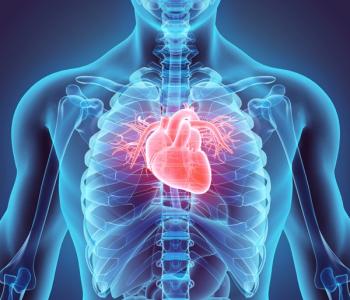
Pediatric Puzzler: Weight loss in a 15-year-old male: A pint-sized problem
A 15-year-old boy with a possible eating disorder.
PEDIATRIC PUZZLER
Weight loss in a 15-year-old male: A pint-sized problem
By Terrill D. Bravender, MD, and Walter W. Tunnessen, Jr.,MD
A colleague has asked you to see a 15-year-old in her practicewho may have an eating disorder. Two weeks ago she saw the adolescentfor his yearly health maintenance visit, the first visit sincelast year. Although the young man had no complaints, your colleaguewas concerned about a weight loss of four pounds since the lastvisit. One year ago he weighed 120 pounds, just over the 50thpercentile for age and along the same curve he had followed sincetoddlerhood. Now, at 116 pounds, he plots out to just above the25th percentile. Having grown three inches over the year (64 inchesto 67 inches), he has maintained his height curve at the 50thpercentile. The physical examination was unrevealing and no cluesturned up on history, but the youngster's mother and physicianare concerned enough to ask you to consult.
As you enter the examining room you find a thin adolescent,with a baseball cap pulled low over his eyes. He and his motherare seated on opposite sides of the room. You ask him why theappointment was made and he responds that his mom and his doctorwere concerned about his weight. The mother interjects that heshould be concerned, too, and then says "Well, Doctor, youdon't need me here. Jordan's old enough to talk to you himself.I'll just be out in the waiting room." After she leaves,Jordan tells you that he has noticed he is thinner. He adds thathe does not particularly like being thin and that he is not tryingto lose weight, but he does not think the weight loss is "anybig deal."
The past medical history is unremarkable except for a brokenarm the boy sustained eight years ago after jumping off the topof his swing set. He is on no medications and has no allergies.There is no history of chronic illness in the family, except thathis great grandmother has diabetes. He lives with his mother,who is a customer-service representative for a clothing cataloguecompany. His parents are divorced, but his father lives in thesame town and sees him often. The father owns a landscaping companyand Jordan occasionally does some weekend work for him. He hasno siblings.
Jordan will soon enter the tenth grade and says that he does"okay" in school. He was an honor roll student in juniorhigh, but during ninth grade he began to lose interest in hisschool work, even failing his algebra class in the second term.Jordan states that he does not want to start back at school thisyear because he thinks it will be "boring." When notin school, he likes to "hang out" with his friends.He used to play baseball and basketball, but he has not playedmuch this summer because his friends do not like to play sports.Jordan admits that he tried cigarettes once but did not like them;he drinks beer with friends "sometimes," has tried marijuana"once or twice," and denies the use of other drugs.He says he has never been sexually active. Aside from some mildfatigue, his review of systems is unremarkable.
The evidence remains thin
You tell Jordan that you would like to examine him and thatyou are going to ask his mother a few questions while he undresses.When you ask his mother why she thinks her son is losing weight,she replies, "I don't know--that's why we're here. I thinkhe might have an eating disorder, but don't girls usually getthose?" When you pursue the eating disorder concern, shesays, "Well, I never see him eat anymore. He seems to sleepa lot and then hardly ever eats dinner with me. At first, I thoughtit was just him being a teenager, but now I think that there mightbe something else wrong with him."
On the way back to the examining room, you think through thepossible causes of weight loss in adolescents. You remember thatin adults the most common cause of unintended weight loss is neoplastic,but you recall that there is little similar information on weightloss in adolescents.1 Weight loss can have a ratherbroad differential, so you think in terms of broad categories.Since the young man has maintained his growth velocity, the causeis more likely to be a result of decreased caloric intake thansomething causing global growth failure.2 For organizationalpurposes you divide potential causes of weight loss into threecategories: inadequate intake, inadequate absorption, and improperutilization.
On inadequate intake, an eating disorder should be considered,but Jordan's mother is correct, approximately 95% of patientswith anorexia nervosa are female, although certain males, suchas wrestlers, are at risk.3 A much more common disorderthat may present this way would be depression. The youngster'sanorexia, increased sleeping, worsened school performance, anddecreased interest in activities he previously enjoyed fit thepicture of a depressed adolescent. You recall that boys are lesslikely than girls to report feeling sad or blue when depressed,and that they may present with acting-out behavior and more nonspecificcomplaints.4 Another cause of inadequate intake wouldbe drug use, particularly of stimulant drugs such as methamphetamineor cocaine, or opiate abuse.
Disorders in the inadequate absorption category would includeinflammatory bowel disease, gluten sensitivity, and parasiticinfections. Finally, improper utilization of energy may be associatedwith diabetes mellitus, thyroid disorders, severe anemia, Addisondisease, malignancy, or human immunodeficiency virus disease.
On physical examination, Jordan's weight has decreased to 114pounds, a loss of another two pounds over the past two weeks.His temperature is 98.2° F, respiratory rate 18 breaths perminute, pulse 82 beats per minute, and blood pressure 110/72 mmHg. Although he has changed into an examination gown, Jordan continuesto wear his baseball cap pulled low over his eyes. You ask himto remove the hat and he reluctantly agrees, saying, "thelight kind of hurts my eyes and gives me a headache." Hissclerae are mildly injected and he blinks frequently, statingthat his eyes feel dry. His mucous membranes are mildly tacky.
The thyroid, heart, and lung examinations are unremarkable.On abdominal palpation there is mild mid-epigastric discomfort.The genital examination is normal with a sexual maturity ratingof IV. The rectal examination is also normal with guaiac-negativestool. The skin and lymph nodes are similarly unremarkable.
As the youngster dresses you consider your approach to theproblem. He may be mildly dehydrated, but there is no historyof polyuria or polydipsia to suggest diabetes mellitus. The heme-negativestool makes inflammatory bowel disease less likely, perhaps, butdoes not rule it out. The mild abdominal tenderness raises thepossibility of gastritis, which may in itself cause weight loss.With a multitude of possible causes of weight loss in mind youdecide to order a urinalysis, complete blood count with differential,erythrocyte sedimentation rate, electrolytes, BUN, creatinine,and thyroid-stimulating hormone.
When you return to the examining room you tell Jordan thatyou plan to order some blood tests, and you ask him a few morequestions about substance abuse. He assures you that he has onlytried marijuana and alcohol and that he has never tried cocaine,amphetamines, or opiates. "Jeez, doc," he blurts out,"if you don't believe me just do a drug test. You know, Iwas actually wondering that myself. I heard that sometimes peopleput other things in the weed and maybe that is what's making melose weight." You tell him that you don't want to get a drugtest to try to catch him lying. "No, really," he says,"one of my friends was smoking what he thought were somegreat blunts, but then he found out that his dealer was puttingcrack in them. I want you to check, but just don't tell my mom."
You include a urine toxicology screen in the laboratory studiesordered. You also ask Jordan to keep a complete food diary forat least one week. He is to write down everything he has to eator drink every day and bring it back with him for the follow-upappointment in two weeks. As he is leaving the office, he stopsand says, "Hey, doc, remember not to tell my mom about thedrug test, okay?"
An overhanging ale-ment
Jordan's laboratory results are unremarkable. His urine toxicologyscreen is positive for cannabinoids but negative for amphetamines,cocaine, opiates, barbiturates, benzodiazepines, and PCP. At histwo-week follow-up appointment Jordan comes without his mother.His weight has dropped another pound to 113. You look over hisfood diary and note that he never eats breakfast and rarely eatslunch. He tends to eat large dinners, but on three of the dayshe only ate a few crackers and drank a glass of juice. You askJordan why he did not eat on those days and he replies, "BecauseI was feeling sick. Like if I ate, I was going to puke."You ask him if he vomits and he says, "Well, only a few times."
He denies trying to make himself vomit and states that he wisheshe could eat more, because by the time dinner comes, he is veryhungry. You ask him more about his other activities and he repliesthat in the evenings he joins his friends riding bikes and "hangingout" at a local rock quarry. He says that he usually drinksa few beers and smokes a joint or two, but he does not think thatupsets his stomach. You pursue this line of questions and findout that Jordan drinks six to ten beers in an evening! He usuallygets a ride home with one of his friends, although on a coupleof occasions he is not sure how he got home. He reaches home at1 or 2 a.m. and sleeps until noon or 1 p.m. He often awakens witha terrible headache, very thirsty, and is frequently nauseated.
Jordan is "hung over" almost every day, the resultof his significant alcohol consumption. On his best days he iseating only one meal and sometimes cannot even tolerate that.The calories in beer do not make up for those missed in meals.His weight loss now has become a secondary issue given the risk-takinghe has disclosed. Faced with a youngster with multiple dangerousbehaviors, you address the issues in terms of immediate risks,intermediate risks, and long-term risks. The most pressing immediaterisk is that he often does not remember getting home at night.This implies that he has been given rides home by drivers whohave also been drinking. An intermediate risk is his repeatedsubstance abuse leading to weight loss and falling school performance.A long-term risk is his potential for substance dependency andalcoholism.
You tell Jordan that you are concerned about his behavior andthat you think his almost daily hangovers and vomiting are causinghis weight loss. He agrees that the frequent vomiting is not goodfor his health and says he will cut his beer consumption to twoto three per evening, so as not to be teased by his friends. Healso agrees that he should not be driven home by anyone who hasbeen drinking and he will walk home instead.
You see him back in two weeks, after school has started, andhe has gained two pounds. He continues to go to the rock quarry,but only on weekends. He usually drinks two beers and has smokedonly one joint since he last saw you. He has missed one day ofschool, due to being "too sick to get out of bed." Heusually walks home from the quarry, but this past weekend he was"too messed up" to get himself home and took a ridewith a friend. His friend may have been drinking, too; Jordanis not sure. You express your concern, and he says that he knowshe made a mistake and that it was probably dangerous. You askhow you can get him additional help in decreasing his substanceuse and whether he thinks that involving his mother or fatherwill help. Jordan agrees to bring his father with him to his nextappointment with you in one week to help arrange outpatient therapy.
Any unintentional weight loss, whether in an adult, adolescent,or child, is cause for concern. The possible causes are many,but one must always consider aberrant behavior, particularly inthe adolescent. Thorough and, often, repetitive history-taking,a careful physical examination, judicious use of laboratory tests,and access to old growth charts will be of tremendous help innarrowing the long list of possible causes. When faced with asubstance-abusing adolescent, the first priority must remain thepatient's safety. At the same time, one must establish a supportiveand nonjudgmental therapeutic relationship.5 Theseadolescents are a challenge to diagnose and may present an evengreater challenge to treat.
DR. BRAVENDER, formerly a fellow in the Division of Adolescent/YoungAdult Medicine, Children's Hospital and Medical Center, Boston,MA, is currently Assistant Professor of Pediatrics at Duke UniversityMedical Center, Durham, NC.
DR. TUNNESSEN who serves as Section Editor for Pediatric Puzzler,is Senior Vice President, American Board of Pediatrics, ChapelHill, NC, and a member of the Contemporary Pediatrics EditorialBoard.
REFERENCES
1. Rabinovitz M, Pitlik SD, Leifer M, et al: Unintentionalweight loss. A retrospective analysis of 154 cases. Arch Int Med1986;146:186
2. Bithoney WG, Dubowitz H, Egan H: Failure to thrive/ growthdeficiency. Pediatr Rev 1992;13:453
3. Hoek HW: The distribution of eating disorders, in BrownellKD, Fairburn CG (eds): Eating Disorders and Obesity: A ComprehensiveHandbook. New York, Guilford Press, 1995
4. Compas BE, Oppedisano G, Connor JD, et al: Gender differencesin depressive symptoms in adolescence: Comparison of nationalsamples of clinically referred and nonreferred youths. J Consultand Clin Psych 1997; 65:617
5. Knight J: Adolescent substance use: Screening, assessment,and intervention in medical office practice. Contemporary Pediatrics1997;14(4):45
Newsletter
Access practical, evidence-based guidance to support better care for our youngest patients. Join our email list for the latest clinical updates.








